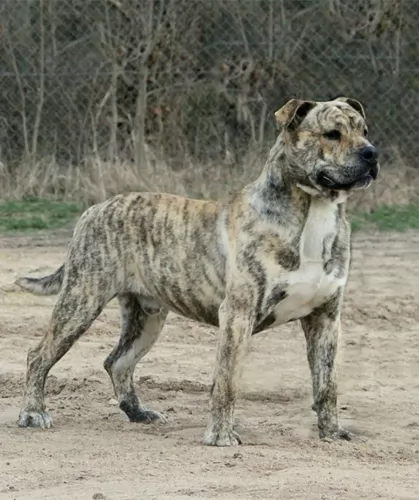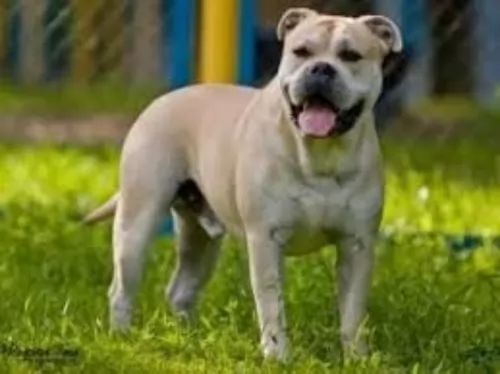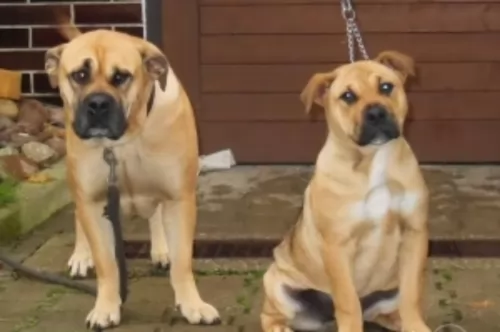 Petzlover
Petzlover Dutch Shepherd is originated from Netherlands but Perro de Presa Mallorquin is originated from Spain. Both Dutch Shepherd and Perro de Presa Mallorquin are having almost same height. Dutch Shepherd may weigh 7 kg / 15 pounds lesser than Perro de Presa Mallorquin. Dutch Shepherd may live 3 years more than Perro de Presa Mallorquin. Dutch Shepherd may have more litter size than Perro de Presa Mallorquin. Dutch Shepherd requires Moderate Maintenance. But Perro de Presa Mallorquin requires Low Maintenance
Dutch Shepherd is originated from Netherlands but Perro de Presa Mallorquin is originated from Spain. Both Dutch Shepherd and Perro de Presa Mallorquin are having almost same height. Dutch Shepherd may weigh 7 kg / 15 pounds lesser than Perro de Presa Mallorquin. Dutch Shepherd may live 3 years more than Perro de Presa Mallorquin. Dutch Shepherd may have more litter size than Perro de Presa Mallorquin. Dutch Shepherd requires Moderate Maintenance. But Perro de Presa Mallorquin requires Low Maintenance
 The Dutch Shepherd is of Dutch origin, hailing from the Netherlands. They were originally used as herding dogs on the farms, where they became a jack-of-all-trades type of dog.
The Dutch Shepherd is of Dutch origin, hailing from the Netherlands. They were originally used as herding dogs on the farms, where they became a jack-of-all-trades type of dog.
The Dutch Shepherd in those days, 100 odd years ago, were also known as Hollandse Herders.
These dogs are more rare in modern days, but when you do find them, they are being used as police or security dogs, as guides for the blind, or simply as family friends.
 Known by several other names such as Majorca Mastiff, Perro Dogo, Ca de Bou and Mallorquin Bulldog among others, the Perro de Presa Mallorquin was almost extinct after World War II.
Known by several other names such as Majorca Mastiff, Perro Dogo, Ca de Bou and Mallorquin Bulldog among others, the Perro de Presa Mallorquin was almost extinct after World War II.
The British brought their own dogs with them into the Balearics, crossing them with native mastiffs. They were used for fighting, explaining why this dog also got the name Ca de Bou as it means Bull Dog.
It is believed that the dogs were crossed with the Perro de Pastor Mallorquin, Alano Espanol and the Bulldog.
 The Dutch Shepherd dog is very similar in appearance to the popular German Shepherds, being a medium to large sized dog.
The Dutch Shepherd dog is very similar in appearance to the popular German Shepherds, being a medium to large sized dog.
The males are slightly heavier than females, but both males and females can stand between 55 and 62cm and weigh between 20 and 32kg.
There are actually 3 varieties found in the Dutch Shepherd dogs - short-haired, long-haired, and wiry or rough-haired. The dog has a double coat, consisting of a woolly undercoat and a top coat. The basic color of the coat is gold or silver through to red, giving rise to the brindle variations. Too much black or white seen in the fur is considered a fault.
In 1914 it was decided that brindle coats would distinguish them from the others.
The eyes of the Dutch Shepherd are dark, almond shaped and slightly slanting, while the medium sized ears are erect and high on the head and the thick tail is slightly curved. The dog has an unusually long tongue which is often found hanging out.
Early training and socializing for this dog is important so that he can learn to stay calm around new people, or visitors to the property.
The beautiful Dutch Shepherd doesn’t like being left alone for too long, loving rather to be involved with all that the family is involved in. They get on well with other pets in the home as well as being child-friendly.
They are happy dogs, who can also be smart and cunning, therefore highly trainable. They soak up new commands easily. Dutch Shepherds are also good watchdogs as they are fiercely loyal, and do not take kindly to strangers.
 The Perro de Presa Mallorquin is a strong medium-to-large sized deep chested dog standing at between 52 and 58cm in height and weighing between 30 and 39kg, both male and female.
The Perro de Presa Mallorquin is a strong medium-to-large sized deep chested dog standing at between 52 and 58cm in height and weighing between 30 and 39kg, both male and female.
This is a molosser-type dog with a strong, powerful build and large head. The skin around the face is thick and loose. The coat of the dog is short and rough and the color is fawn to light brown and reddish tan shade He can also be brindle too or black with tan markings.
The jaw is strong, the ears short and floppy though they have always been traditionally cropped. When left they can be folded backward. The tail is long, set low and reaches to the hock.
This is an intelligent dog who is going to require training and socialization if you want to manage it properly. Training and socializing a dog can be very helpful and help a dog like this to be more obedient and well behaved.
As a puppy growing up with kids who have been taught to treat animals kindly and with respect, the Perro de Presa Mallorquin can get on well with children. However, if you’re bringing an older dog into your home, the very nature of the dog may mean it not getting on with children.
This dog is quiet by nature and will be loving and loyal towards his owner, being protective towards him. He is strong-willed and will do best with a strong, firm, kind, patient dog owner who is consistent.
He is active and will fit into life in the suburbs or the countryside as opposed to life on a tiny property in the city.
 Your alert, intelligent and somewhat rare Dutch Shepherd is a loyal, protective dog, and while he can be aggressive around intruders and be a great guard dog, he can also be a gentle, loving animal around his human family members.
Your alert, intelligent and somewhat rare Dutch Shepherd is a loyal, protective dog, and while he can be aggressive around intruders and be a great guard dog, he can also be a gentle, loving animal around his human family members.
Though his tongue is long and often hangs out, you won’t have to contend with drooling. He is a wonderfully active dog and doesn’t easily gain weight. He isn’t a barker or howler, and his exceptional intelligence makes him highly trainable.
Whether there are children or other animals in the house, you can rely on your Dutch Shepherd to get on well with them, making him a wonderful family pet and canine friend.
 Your Perro de Presa Mallorquin is a loving dog, albeit it a bit stubborn. The key to having a dog with a sound temperament is to have him trained and socialized as this will do him the world of good and make him obedient and more balanced.
Your Perro de Presa Mallorquin is a loving dog, albeit it a bit stubborn. The key to having a dog with a sound temperament is to have him trained and socialized as this will do him the world of good and make him obedient and more balanced.
Irresponsible dog owners like to tie dogs like this up and leave them in the yard day after day to guard the home. They’re to blame when the dog becomes bored, frustrated and destructive.
Brought up correctly and given the right amount of love and care, the Perro de Presa Mallorquin is a brave, confident, quiet dog that can become a loyal and loving pet and companion.
 The Dutch Shepherd dogs are the healthiest of the Shepherd breeds. They have relatively few health problems.
The Dutch Shepherd dogs are the healthiest of the Shepherd breeds. They have relatively few health problems.
However, like the German Shepherds they may develop hip dysplasia, but this is in fact fairly rare. Get your pet to the vet if you suspect this in your dog because it can lead to lameness.
In 2018 the University of Minnesota identified a disease in Dutch Shepherds called Miositis. This is an inflammatory myopathy causing painful inflammation of the skeletal muscle tissue.
 To avoid some of the common dog illnesses there are, you want to give your pet the best care possible. Of course there are always some dog illnesses that plague a dog and where he will require veterinary intervention. Hip dysplasia is one and larger dogs are more prone to getting this joint disease which can be very debilitating for your dog.
To avoid some of the common dog illnesses there are, you want to give your pet the best care possible. Of course there are always some dog illnesses that plague a dog and where he will require veterinary intervention. Hip dysplasia is one and larger dogs are more prone to getting this joint disease which can be very debilitating for your dog.
Other health issues can include osteosarcoma and lymphoma which are types of cancer Eye problems such as ectropion or entropion of the eyelids is where you'll find the eyelids turning either outwards or inwards. Also be aware of cataracts of the eyes as well as Cherry eye.
 Unfortunately Dutch Shepherds shed quite a bit of hair during their shedding period in spring and autumn. This makes regular brushing important during these seasons so as to remove the dead hairs, especially from the undercoat.
Unfortunately Dutch Shepherds shed quite a bit of hair during their shedding period in spring and autumn. This makes regular brushing important during these seasons so as to remove the dead hairs, especially from the undercoat.
The wire- or rough-haired variety shouldn’t be brushed but should rather be groomed by a professional groomer every 6 months or so.
Their nails need to be trimmed when necessary, to avoid cracking, splitting, or an injury.
Their ears can be cleaned weekly to get rid of any debris or wax build-up. This, if left, can lead to infection. Brush his teeth 2 or 3 times a week to avoid dental disease which brings on a host of illnesses.
These dogs do need regular exercising, and at the same time need to be physically and mentally stimulated. He is the kind of dog that has been used for herding purpose on the farm and he just craves activity. Take him with you on your walks and include him in ball games, hikes, jogging, swimming or when you go cycling – he is game for all kinds of activities.
The formula for their diet would be that of a medium to large dog with high energy levels. The top commercially manufactured foods have been developed to include all the important vitamins and minerals. Fish oil can also be added to their food to keep the coat shiny.
Add in cooked rice, cooked vegetables and chicken from time to time and be sure to add in some raw meat occasionally to prevent problems with the skin. Always ensure that your pet has fresh, cool water to drink.
 Your Perro de Presa Mallorquin is going to need a walk every day if you want him to be physically and mentally sound. He loves to sniff around and see the world beyond his garden.
Your Perro de Presa Mallorquin is going to need a walk every day if you want him to be physically and mentally sound. He loves to sniff around and see the world beyond his garden.
This is a low maintenance breed, requiring a brush twice a week just to maintain the coat in its heathy state and to remove loose hairs.
This purebred dog will need an adequate diet to keep him in tip top shape. He likes his food and because he is big and energetic, will require commercially manufactured dog food that is high in good quality protein. In fact always check the packaging that protein sources are among the top ingredients listed.
Growing puppies will require 4 helpings of food a day which can later become 2 meals a day.Try to include some home-made food for him. It doesn’t have to be complicated, in fact dogs want simplicity and consistency with their food so that they don’t get upset stomachs.
Boiled chicken, brown rice or pasta and cooked vegetables such as sweet potato, carrots and spinach chopped up and added into the kibble occasionally can be a wonderful tasty treat for your pet. It is also a good idea to try and give him some raw meat from time to time as well.
Avoid all spicy, unusual foods for your pet – he doesn’t want any surprises when it comes to his food. Ensure he always has a bowl of fresh, cool water available.